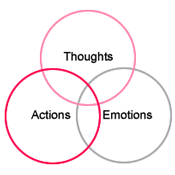 In part one of our 3 sure-fire techniques to giving your day an instant lift, we covered why it’s so important not to let a negative mood spiral out of control and become a dangerous habit. If you missed part one, you’ll find it here: part one.
In part one of our 3 sure-fire techniques to giving your day an instant lift, we covered why it’s so important not to let a negative mood spiral out of control and become a dangerous habit. If you missed part one, you’ll find it here: part one.
In this mini-series we’re bringing you 3 ways you can lift your mood in less than 60 seconds, which has got to be worth a try, hasn’t it?
In part two, we’re bringing you one of my favourite mood lifters. Are you ready yet? [Read more…] about 3 Sure-Fire Techniques For Giving Your Day An Instant Lift – Part Two

3 Sure-Fire Techniques To Give Your Day An Instant Lift – Part One
We all have days where things get us down. Maybe it’s the traffic on our way to work, maybe the boss yelled at us or we can end up feeling low for no particular reason.

The thing is that this can quickly become a downward spiral. It can be tough to drag ourselves out of it and by the end of the day we’re feeling really miserable.
So what?
Once in a while, it’s ok to do that. But, when times are tough, this kind of cycle can easily become a habit. The risk is that feeling miserable can end up as our “usual” mood and we become more negative. This affects our relationships, our health, our job and every other area of our life.
Is that what we really want?
Unlikely. So what’s the alternative? [Read more…] about 3 Sure-Fire Techniques To Give Your Day An Instant Lift – Part One

What On Earth Is NLP?
Although more people than ever have heard of Neuro-Linguistic Programming, most people we meet look at us blankly, asking “what on earth is NLP?”
So, here goes!
Have you ever had the experience of a meeting that went particularly well, or a project that met every deadline and criteria? And yet there are times when it just doesn’t go as well?
NLP is like a switch you can flick, to make sure your successes become your new standard. It gives you an understanding of what made the difference in those situations and what the critical changes are, which would mean you can always perform to that level.
NLP-based training gets to the basis of how we think, feel and behave. So you can just imagine the wide-reaching impact it can have on our performance.
Where did NLP come from?
The jargon of the name “NLP” gives the wrong impression.
NLP stands for “Neuro-Linguistic Programming”.
It’s about how the way we think influences our behaviour and emotions – and hence our performance.
NLP isn’t scary. It’s actually a set of simple, yet highly effective, tools and techniques that help us work with our subconscious mind. It’s an outstanding personal development tool.
With NLP, you can get to the root of the habits and beliefs that are driving behaviour we no longer want – even if we don’t yet know what those habits and beliefs are. It’s one of the easiest ways to create transformation in the way we experience life and how we behave – influencing our happiness levels!

Put simply, it’s about understanding the relationship between our thoughts, emotions and actions, so we can make the subtle changes that make all the difference.
NLP has its roots in psychology and the study of excellence. It was born 30+ years ago from the work of Richard Bandler (a mathematician) and John Grinder (a linguist), who studied some of the world’s greatest communicators.
Their research identified not only the elements that made the critical difference, but also how to teach these vital skills to others, to help them unlock their true potential.
NLP helps us identify the critical differences between people who excel and those who are just “getting by” in the way they communicate, influence, lead, motivate and succeed.
How does it work?
Don’t imagine a pink elephant in a red tree.
What happened? You thought of an elephant in a tree? Even though the instruction was not to?
Our unconscious mind – the part of us that puts the car keys in random places, drives us on motorways when we’re concentrating on the radio and remembers to keep our lungs breathing and our heart beating – doesn’t understand negatives.
If you tell your brain not to do something, first you have to imagine actually doing it, and then add the “not”.
This is clearly seen with young children, who even speak in this way – “spill drink not” is the type of thing heard in toddlers’ homes; not “don’t spill drink.” So if we keep telling our unconscious mind not to do something, we’re actually reinforcing and increasingly the likelihood of keeping that unwanted habit.
This means that our usual approach to personal change of trying to stop doing something often completely reinforces the behaviour we want to change, because our unconscious mind is constantly having to imagine it.
We really need to learn how to communicate with our subconscious mind – the bit that does all the “auto-pilot” stuff for us. Without this communication channel, we’re almost leaving success to chance.
NLP-based training and mentoring can help you find out how you communicate with yourself and others – and how this affects your performance.
You will then discover how to change the things that aren’t working, even challenging long-held assumptions about what should or shouldn’t work, whilst polishing the strategies that you want to keep.
When you know how to work with your subconscious mind, you can start to experience your true potential and break free of old thought patterns or habits that have been holding you back.
How To Get Started?
Go On A Course
Some people like to go on a face-to-face course. Here’s an up-to-date list of our courses.
Get Some Mentoring
Some people like to get some one-to-one mentoring, to deal with specific issues or challenges. Find out about Clare Josa’s one-to-one mentoring for businesses or our personal one-to-one mentoring.
Arrange A Bespoke Course
And, if you’re in business, you might like to find out about our bespoke NLP In Business courses.
Are you ready to find out more about how NLP could help you?
Want To Get In Touch?
Here’s how to get in touch:
Got Comments?
If you’ve got comments or ideas to share, the easiest way is via the comments box under each article. We read them all!
Want To Connect?
 |
Want to contact Clare Josa directly?
![]() You can call Clare Josa and our office on (UK +44) 020 8798 0903 or use the contact form, below, and a relevant member of our team will get back to you within 48 hours.
You can call Clare Josa and our office on (UK +44) 020 8798 0903 or use the contact form, below, and a relevant member of our team will get back to you within 48 hours.
We look forward to hearing from you.
[si-contact-form form=’4′]
Please note:
Clare Josa and the Beyond Alchemy team is unable to address individual personal challenges outside of a formal mentoring agreement. If you’re interested in mentoring, you can find out more about personal mentoring or one-to-one mentoring for businesses.

Quick Fix: Could You Be Kind Today?
Could you be kind today?
Find out why this Beyond Alchemy Quick Fix might not be quite what you’re expecting.
I’d love to hear your thoughts via the comments box.
Thanks!
Clare

Book Of The Month: Spontaneous Healing Of Belief
Gregg Braden is my kind of philosopher. With a strong background in physics and engineering, he brings a rigorous, common-sense approach to the metaphysical world. This means he writes about ‘hippy stuff’ by first analysing the evidence and then presenting conclusions.
His conclusions are much the same as all the others writing about ‘hippy stuff’. But, if you’re even vaguely sceptical, then Gregg will help you weigh up the data and draw your own conclusions, rather than telling you what to believe.
So would we recommend this book?
[Read more…] about Book Of The Month: Spontaneous Healing Of Belief
Are You Trying Too Hard To Feel Happier?
Whatever we’re doing in life, most of the time, we just want to feel happier. Whether it’s getting the bigger house, the better job or the perfect relationship, we want to feel happy.
Yet how many of us have fallen into the trap of trying, over and over again, to make something work?
Whether it’s a relationship, a project, a job interview or even assembling flat-pack furniture, we fall back on the old proverb:
“If at first you don’t succeed, try, try, try again.”
There are two problems here:
- Going Slightly Mad
They say that doing the same thing over and over again, whilst expecting different results, is the one of the first signs of insanity.
For most of us, “try, try, try again” involves just that…
. - “Trying” Gets Us Off The Hook
When we use the word “try” – either out loud or in our heads – we’re giving ourselves unconscious permission to fail.Think about it:
“I’ll try to get that done by Tuesday.” Will it happen?
“I’ll try harder to get it right next time.” Will it be different?
What Not To Do
This isn’t the time to give up or admit defeat. Just because your current approach hasn’t been working doesn’t mean there isn’t one that will bring the results you’re hoping for.
It’s also not about focussing on what’s been going wrong or worrying about it. It has been said that worrying is just a great way of creating a future you don’t really want…
What You Can Do Instead
Do something different. If what you’re doing isn’t working, play with another approach. Look back to similar situations in the past where you have made it work and see whether there are ideas you could apply now.
Focus on on what you want instead, rather than where you are now. Start telling a different story. Breaking the cycle could turn things around.
And instead of the word “try“, how about more positive phrases like “I will…” or “I can…” or – if you’re not quite sure – “I hope…”
Above all, if you don’t think you can, you can’t and you won’t.
If it’s worth doing, then “trying” is less likely to get you there. How about rewriting the old proverb:
“If at first you don’t succeed, change what you’re doing.“
Bottom Line:
Instead of trying too hard, over and over again, how about tweaking your strategy and watching how fast you get to where you want to be going? Are you ready to feel happier, now?
- « Go to Previous Page
- Page 1
- Interim pages omitted …
- Page 86
- Page 87
- Page 88
- Page 89
- Page 90
- Interim pages omitted …
- Page 96
- Go to Next Page »

